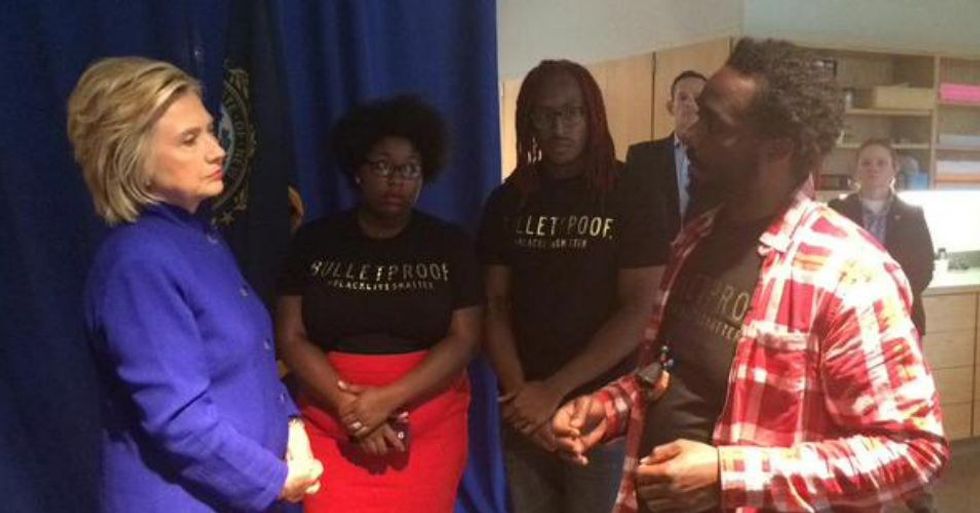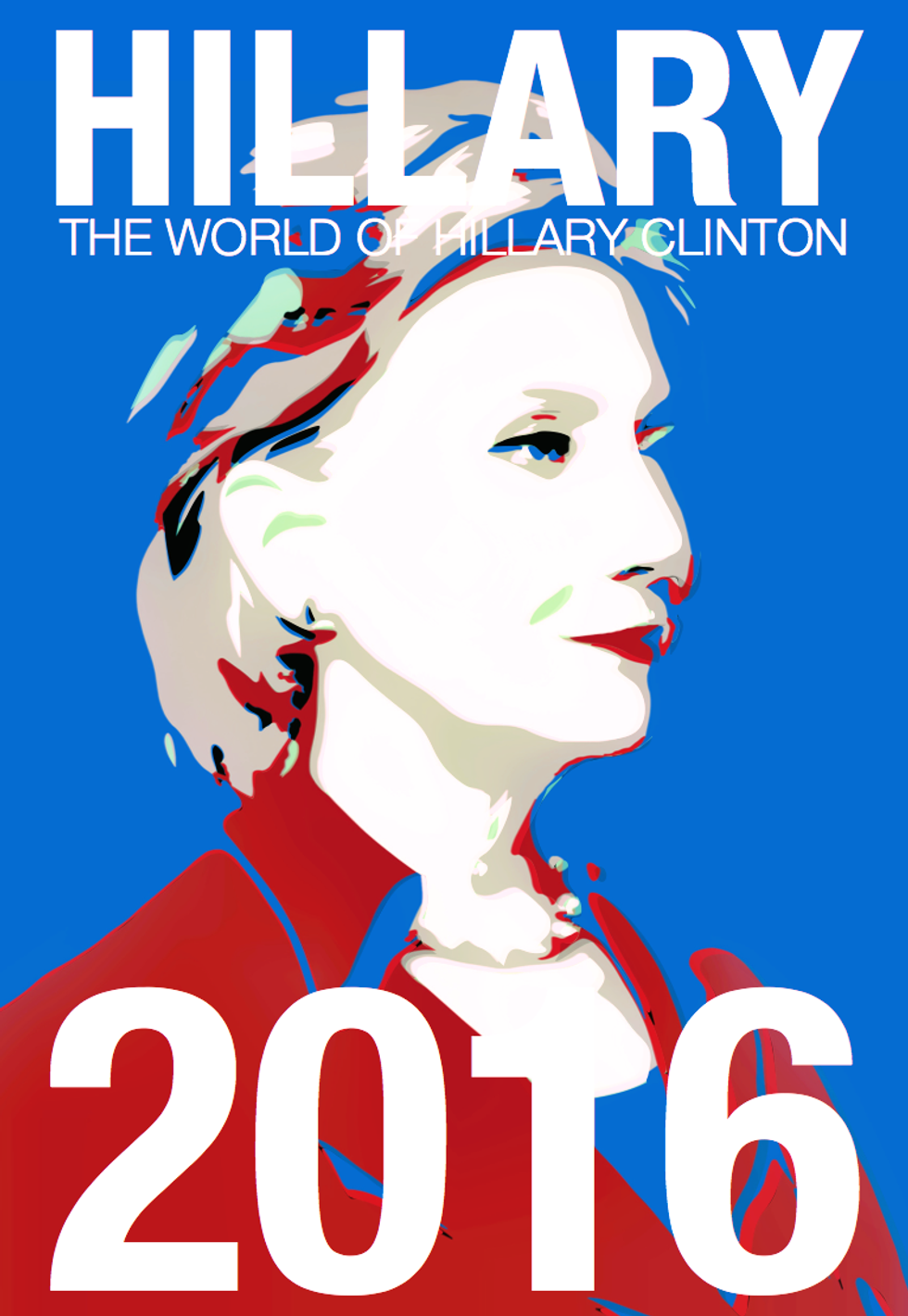After a campaign stop in Keene, New Hampshire, earlier this month, Hillary Rodham Clinton met with several leading activists of the Black Lives Matter movement in an overflow room. Clinton had barred them from sitting in the main media room due to the activists’ plans to disrupt the forum as they had Bernie Sanders’ forum several weeks ago. Afterward, she spoke with them candidly in the overflow room with just one camera and a transcript of the discussion released. The video is posted in two parts via Good magazine online, and the highlights of Clinton’s responses and prompts to activists are buzzing all over the news.
The activists that spoke to her, led by Julius Jones of Boston, pressed her about issues particularly affecting Black Americans, which include “unfortunate government practices” such as mass incarceration, less opportunity for children to succeed and have the same privileges as whites, and economic unfairness. Particularly pertinent to Clinton is mass incarceration.
The most common thread in this exchange, mass incarceration is tied to Clinton because of her husband Bill’s signature on a bill in 1994 that increased prison sentences. As Bill Clinton said in a speech given in Philadelphia in early July, “I signed a bill that made the problem worse. And I want to admit it.” In addition to this admittance of some responsibility for the mass incarceration problem, he offered some insight into the changes seen years later, saying, “The good news is that we had the biggest drop in crime in history. The bad news is that we had a lot [of] people who were locked up, who were minor actors, for way too long."
Many are noting Bill’s admission of culpability as a hit to Hillary’s campaign because she does not admit any culpability in this interview with activists, even when they pointedly tell her she is somewhat responsible. Mr. Jones asks her the following questions during their exchange in New Hampshire:
“I genuinely want to know: You, and your family, have been in no uncertain way partially responsible for this, more than most. Now, there may have been unintended consequences, but now that you understand the consequences, what in your heart has changed, that’s going to change the direction of this country? What in you, like not your platform, not, not what you’re supposed to say, like how do you actually feel, that’s different than you did before? Like, what were the mistakes and how can those mistakes that you’ve made be lessons for all of America, or a moment of reflection on how we treat black people in this country?”
Clinton’s answer, after patiently nodding and listening intently, begins with her assertion of how her adult life has been committed to kids and helping all children, from every race and economic background, to “live up to their God-given potential.” She then tells the activists that she feels “committed and responsible for” doing all she can to help correct some of the wrongs from the past, but she does not admit responsibility as the activists may have been seeking by asking her these questions.
She does acknowledge there must be some “reckoning” for problems form the past and that the United States has yet to “recover from its Original Sin” of racism and oppression. Her next point, however, is that the activists must have a ready and practical plan if they want their problems to become first priorities on political agendas. She uses the women’s, civil rights, and gay rights movements as examples of groups that had several practical plans and political systems in place to back up their movements.
She tells the activists that they can "get lip service from as many white people as you can pack into Yankee Stadium and a million more like it that will say 'I get it..I’m going to be nicer which is not good enough, the way I see it.'" Her point here being that this problem will not be fixed by just the movement alone and its call for more equality, but rather hard and strict new reforms and practices that are concrete and practical plans for the movement to become a political priority.
The last and most poignant part of this exchange begins when Mr. Jones mentions that the activists are going to “change white hearts,” to which Clinton immediately cuts in and asserts, “I don’t believe you change hearts. I believe you change laws, you change allocation of resources, you change the way systems operate. You’re not gonna change every heart. You’re not.” She goes on to say, however, that the activists may be able to change some hearts, but better to change government systems and help people live safely and have all of the rights and privileges they deserve not just through changing hearts.
If you type this topic into any search engine, you will immediately see dozens of articles and pieces written by journalists from every news outlet, and each has a different opinion on this exchange. Many think Clinton was too brash and only met with the activists to save face after barring them from the large media room. Others are in total agreement with her stance on the need for legitimate, practical plans to back up words, a theme that has always been a part of her political platform. I too have my own opinions on this interview, but like anyone else, these are just my thoughts and are not an attempt to sway you in any way.
I have tried to pay particularly close attention to Clinton over the last few weeks because I anticipate that she will be the Democratic representative in the race to president. We could argue all day about her email scandal and the possibility of Joe Biden being the representative if the emails tear Clinton down, but for right now, she will be the representative in my mind. In saying that, it is important to follow her speeches and actions about highly sensitive and pertinent events and movements, including Black Lives Matter.
In this interview, I believe Clinton balanced being candid and blunt while listening intently and absorbing questions given to her. Her evasive answer to the question about her own involvement to mass incarceration may have angered some, but to me it was just a smart political move. Clearly her husband had a major hand in pushing mass incarceration to the level it is at today, but Clinton would be shooting herself in the foot if she said this was her fault. Instead, she deflected to the good work she has done throughout her career to help impoverished minority children and then prompted the activists on how they can further improve their movement. On this point, I simply would say that Clinton left the question up to her husband to answer, which he already did earlier in the summer.
My biggest takeaway, however, is from that last exchange about “changing white hearts." Clinton says that one can’t change hearts, and I am in agreement. Think about it this way: an elderly couple from deep in Alabama or Georgia who has grown up on the racist stories and times of the South has inbred racism in their hearts. The Black Lives Matter movement simply will not change their hearts and views because they are so woven into their identities. It should be noted that not everyone in the South, elderly or not, has racist tendencies. This is simply an example of the stereotypic racist demographic.
What is important about changing hearts, however, is that the focus should not be on those elderly racist folks from inherently racist communities, but rather young adults and young children around the country who are at the prime age of being so impressionable and malleable that it is crucial to teach them the difference between racism and equality and make this the new generation of peace and progress. This is what I believe Clinton is trying to point out in saying that we cannot change hearts. Rather, to put it in my own words, we can teach the youth of America about this problem and how it is in our hands to end it now and move forward instead of forever moving backward.
The most logical thing she said in this short interview was that three other major movements, women’s rights, gay rights, and civil rights, all had practical and feasible plans to set their movements in motion. They had political systems and rational actions in place to back up their words and protests, and they have succeeded in breaking through the glass ceiling of their movements and bringing their issues to the highest platforms. It is now time for the Black Lives Matter movement, according to Clinton, to set these plans up, and she may be the exact person to take these plans into her political folder and begin enacting them in little over a year.























